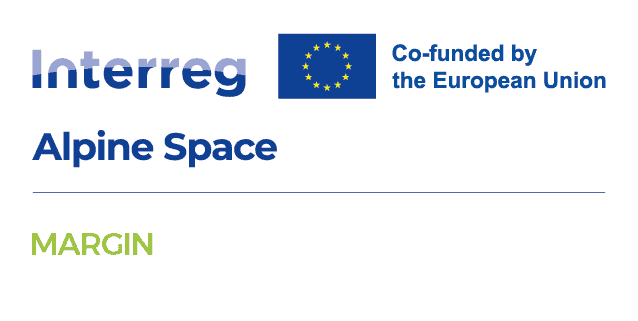
Overview
Alpine cities face unique groundwater issues, including the impact of climate change and rising competition for groundwater use. To address these concerns, MARGIN helps cities understand their vulnerability and risk, building resilience to future groundwater changes. The project offers city-tailored management for upcoming groundwater difficulties, creating the potential to replicate best practices and accelerate their implementation in Alpine cities, thus strengthening preparedness and capacity to cope with the impacts of climate change.
Factsheet
- 2021 – 2027
- Climate resilient and green Alpine region
- SO 1.1 - Promoting climate change adaptation and disaster risk prevention, resilience, taking into account eco-system based approaches
-
- AG6 Natural resources
- AG8 Risk governance
- AG9 Energy efficiency and renewable energy
- 09/2024
- 08/2027
- 2.985.084 EUR
- 2.238.813 EUR
Partners
- Lead partner
- Germany
- Oberbayern (DE21)
- München
- Kai Zosseder
- kai.zosseder@tum.de
- Slovenia
- Zahodna Slovenija (SI04)
- Ljubljana
- David Kastelec
- david.kastelec@ljubljana.si
- Italy
- Lombardia (ITC4)
- Milano
- Christine Ballarin
- christine.ballarin@comune.milano.it
- Germany
- Oberbayern (DE21)
- Munich
- Patrick Kotyla
- patrick.kotyla@muenchen.de
- Austria
- Oberösterreich (AT31)
- Linz
- Romed Ruggenthaler
- r.ruggenthaler@linzag.at
- Austria
- Wien (AT13)
- Vienna
- Cornelia Steiner
- Cornelia.steiner@geosphere.at
- Slovenia
- Zahodna Slovenija (SI04)
- Ljubljana
- Mitja Janža
- mitja.janza@geo-zs.si
- Italy
- Lombardia (ITC4)
- Milano
- Giovanni Crosta
- giovannibattista.crosta@unimib.it
- Austria
- Wien (AT13)
- Vienna
- Christian Griebler
- christian.griebler@univie.ac.at
- Slovenia
- Zahodna Slovenija (SI04)
- Ljubljana
- Nataša Mori
- natasa.mori@nib.si
- Germany
- Darmstadt (DE71)
- Frankfurt
- Andreas Kress
- a.kress@climatealliance.org
- Germany
- Köln (DEA2)
- Hennef
- Arthur Guischet
- guischet@ewa-online.eu
- 48.1490727511.567444920339295
- 46.0498090514.50707959564592
- 45.46666019.1904174
- 48.13778811.575343667017169
- 48.280808514.3093233
- 48.24862595000000516.356562264678487
- 46.0708530514.5146146672204
- 45.51829759.2137546
- 48.213128416.360685994114505
- 46.051076614.46985
- 50.117673858.636413400398371
- 50.7747373499999957.2773661976965
Outcomes
-
Catalogue of fact sheets for the current state of groundwater management in Alpine cities and needs for future challenges, assessed in pilot cities by a transnationally transferable approach
DownloadThe catalogue of fact sheets describes current data handling, on-site management and adaption strategies, as well as country-specific/regional regulations and policies regarding present groundwater risks and adaptation measures in the pilot cities. The fact sheets outline lacks, barriers and requirements for a groundwater sustainability management, identified via stakeholder interaction. A general approach for this assessment is deviated from outcomes and lessons learned in the pilot cities. -
Validation of groundwater potential, risk assessment and recommendations for development of adaption strategies in Alpine space pilot cities
Potential and risk assessments are demonstrated and validated in pilot cities by applying harmonized transferable approaches, which feed into O2.2. Data by pilot cities serve as input for the assessment, are supplemented by new field data and jointly analysed by all PPs. Assessment results are cross-checked with relevant cities’ stakeholders (O1.1) and transmissive recommendations for development of adaptation strategies are evolved. Factsheets and maps create awareness in the cities and beyond -
Guideline to assess groundwater potentials and risks due to climate change impacts and urbanization, including recommendations for the development of adaptation strategies on city-scale
The guideline comprises approaches to assess groundwater potentials based on quantity and quality, as well as impacts of climate change and urbanization induced groundwater changes on various city values and ecosystem health. The approach to assess risks builds on jointly defined, transnationally applicable vulnerability and risk indicators (e.g. protocols for biodiversity assessment) and on specific city needs and conditions (O1.1), incl. recommendations to develop adaption strategies. -
Validating best practice for implementation of groundwater sustainability management at pilot cities in the Alpine space
Validation of the successful implementation of groundwater sustainability management in pilot cities applying transferable guidelines, approaches and tools from the toolbox (A3.3). The assessments and strategies approaches will be implemented and tested i) in the groundwater management tool (GEO.KW web app) used by the Munich City administration, ii) in Milan integrated and combined in provided urban-scale models iii) in other pilot and observer cities depending on the evaluated capabilities. -
Toolbox for implementation of Groundwater Sustainability Management on city level to build climate resilience and promote a sustainable use of potentials
The toolbox for implementation of a user-oriented Groundwater Sustainability Management regarding future groundwater changes in cities includes: tailored guidelines for city administrations to conduct and implement a management structure into city’s administration/for data-handling and monitoring/for vulnerability and risks assessment, catalogue of evaluated adaptation strategies, measures and implementation in policy instruments, gamebook, best practice examples and tools.
Pilots
-
Munich, Germany
Munich, Germany’s third‑largest city with over 1.6 million residents, lies about 80 km north of the Alps on the Munich Gravel Plain. The city sits at an average elevation of 519 m and is shaped by the River Isar and several smaller streams, while the southern forests and northern wetlands reflect the influence of shallow groundwater and post‑glacial landscapes. Beneath Munich, thick layers of gravel and sand form a highly permeable aquifer that can store large quantities of clean groundwater, making it an important resource for both the city’s water reserves and thermal uses such as groundwater heat pumps. Groundwater levels differ across the city—deeper in the south and much shallower in the north—and flow directions are strongly influenced by the Isar valley, leading to locally high flow speeds.
Munich’s cool temperate climate is changing, with rising temperatures and more frequent extreme weather events that increasingly affect groundwater conditions and future water management decisions.
Munich is taking part in the project because groundwater is becoming more important for both climate adaptation and energy planning, especially as more buildings use groundwater for heating and cooling. The city wants to better understand how climate change, urban growth, and thermal use influence groundwater levels and temperatures. Munich brings strong expertise in environmental management and works closely with the Technical University of Munich on groundwater and renewable-energy research. With its extensive monitoring network and large collection of groundwater data, the city can provide valuable insights into long‑term trends and existing challenges. By joining the project, Munich aims to improve data handling, strengthen groundwater protection, and integrate the results into future‑oriented urban planning and climate strategies.
-
Ljubliana, Slovenia
Ljubljana, Slovenia’s capital and largest city, has about 291,000 inhabitants and lies in the Ljubljana Basin, surrounded by Alpine and karst regions. The city sits at an average altitude of 299 m, with a landscape shaped by alluvial sediments that host one of the country’s most important aquifers. Groundwater is Ljubljana’s sole source of drinking water, extracted from five well fields and requiring almost no treatment due to its high quality. The Ljubljansko polje aquifer is highly permeable, up to 100 m thick, and mainly recharged by the Sava River, making it both productive and vulnerable to pollution. Climate trends—rising temperatures, increasing rainfall, and fewer snow days—further affect groundwater dynamics and pose growing challenges for urban water management.
Ljubljana is participating in the project because the protection of its groundwater resources is essential for the city’s long‑term water security. With strong experience in spatial planning and environmental monitoring, the city can directly apply new insights to improve local water management practices.
Ljubljana also brings valuable knowledge from previous EU-funded initiatives focusing on groundwater quality, geothermal energy use, and climate adaptation. Through this project, the city aims to deepen its understanding of current and future risks to its aquifer and identify practical measures for sustainable resource use. Close cooperation with local stakeholders ensures that the project’s outcomes can support long‑term planning and deliver tangible benefits to the entire community.
-
Milano, Italy
Milan, Italy’s second-largest city and a major economic hub, has over 1.37 million inhabitants and sits at the heart of the densely urbanised Po Valley. The city lies at an average elevation of about 120 m, with gently sloping terrain formed by thick alluvial deposits that host several productive aquifer layers. These Quaternary aquifers, composed mainly of gravel and sand, are highly permeable and provide an important groundwater reservoir for municipal, industrial, and agricultural uses. Groundwater generally flows southeast following the regional slope and is influenced by rivers, canals, and urban infrastructure. Climate trends—characterised by rising temperatures, intense heatwaves, and increasingly variable precipitation—add further stress to groundwater resources and complicate management in this highly urbanised environment.
Milan is participating in the project because groundwater plays a key role in meeting the city’s water and energy needs, especially with growing interest in shallow geothermal use. The city brings strong competences in climate resilience, renewable energy planning, and urban sustainability through its involvement in major networks such as Eurocities, C40, and the Global Resilient Cities Network. Milan has already faced challenges linked to groundwater flooding, scarcity, and thermal changes, making it an important case for developing improved management tools. Participation in the project allows the city to better understand current pressures on its aquifers and plan for sustainable future use. By collaborating with regional authorities and utilities, Milan aims to integrate project results into its long-term climate and energy strategies, supporting its path toward decarbonisation.
-
Linz, Austria
Linz, Austria’s third-largest city and capital of Upper Austria, has around 214,000 inhabitants and is located in the Linz Basin along both sides of the Danube River. The city lies at an elevation of 263 m and features diverse terrain, from the flat basin floor to surrounding hills such as Pöstlingberg and Lichtenberg. Linz sits on a complex Quaternary aquifer system formed by glacial and alluvial sediments, which includes highly permeable gravel deposits up to 30 m thick that support significant groundwater resources. Groundwater dynamics in the area are strongly influenced by riverbank filtration from the Danube and Traun Rivers, as well as by extensive hydraulic regulation linked to the Abwinden‑Asten power plant. Climate trends—including rising temperatures, more frequent heatwaves, and increasingly intense rainfall events—exacerbate pressures on Linz’s groundwater system and complicate sustainable urban water management.
Linz is participating in the project because the city’s water supply relies on groundwater, with three of its four waterworks located directly within the urban area. As the municipal water and wastewater operator, LSG brings extensive experience in groundwater monitoring, water quality management, and long-term aquifer protection. The city can contribute valuable datasets and operational knowledge from its large monitoring network and groundwater modelling activities. Participation allows Linz to better understand how climate change, urban heat, and hydraulic regulations are affecting groundwater quantity and quality. By working with local authorities and stakeholders, the city aims to translate project findings into practical measures that support sustainable groundwater use and future urban planning.
Project calendar


